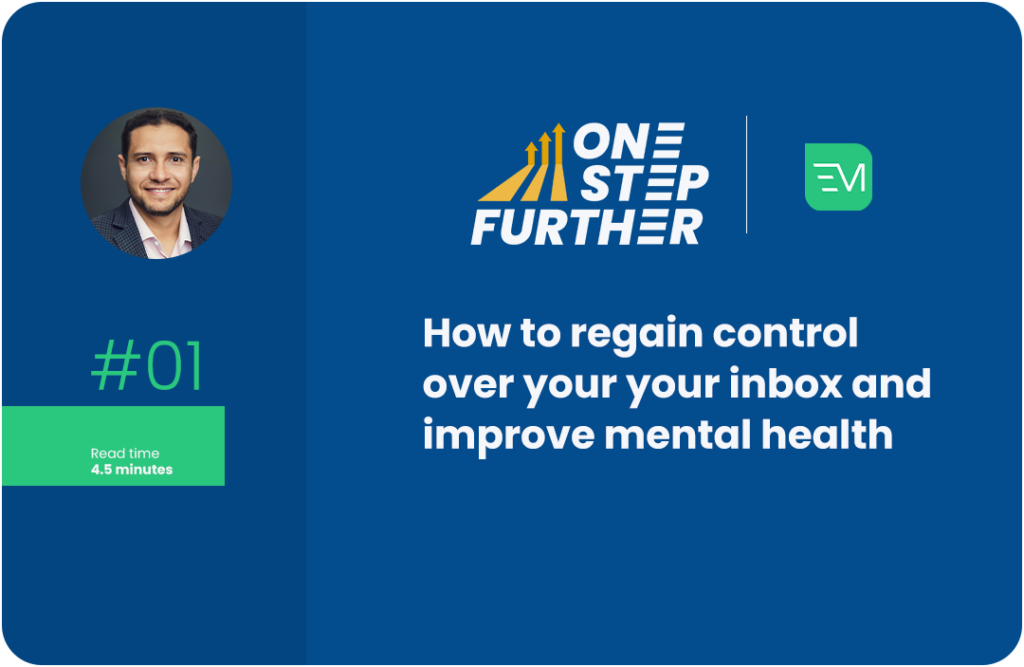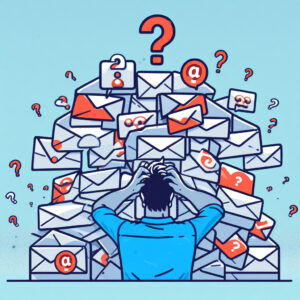
🚀 How to regain control over your inbox and improve mental health 🧠
Read time: 4.5 minutes
Hi there!
Welcome to the very first edition of the One Step Further Newsletter!
Thank you all for being early supporters and joining during the pre-launch; it means a lot to me. 🙏🏼
I created The One Step Further newsletter with two different principles in mind:
Improve my knowledge
One of the four steps of the Feynman Technique to learn anything is to explain the content you are trying to learn to someone else. By creating this newsletter, I am solidifying my learning.
Sharing and giving more than taking
Another principle I apply to my life is to share. There is no point in acquiring knowledge if I can’t use it to help others. 🥰
With this in mind, let’s get one step further and achieve our fullest potential in our careers and personal lives! 🚀🚀🚀
Enjoy the reading!
With gratitude,
Eder
| Would like to sponsor this newsletter? Click here! |
The step of the week 👣
| Each week, this section will cover an actionable micro habit that you can implement right away. By piling up small changes in your daily routine, you will compound and obtain significant results over time. |
📥 Improving email productivity – step one 🚀
Do you know where adults spend most of their time online? 🤔
If you said social media, think again. Surprisingly or not, it is on the old and good email. 📩
According to MIT and University of California researchers, workers check their emails 11 times per hour, with 84% keeping their email app open throughout the day.
A report from McKinsey also revealed that employees spend 28% of their workweek reading, composing or responding to emails.
On average, a person receives 87 messages per day.
Think for a second and consider the amount of alert interruptions and the productivity loss they generate. ⚠️ 📉

On the other hand, can you imagine the potential if we could optimize this process?
There is a way!
As this week’s step, let’s start regaining control of our Inbox and not let it become somebody else’s TO-DO list. 💥
Starting fresh and getting rid of multiple archiving folders 🗂️
For the first step, I would like you to select all the messages in your Inbox that you have already processed and are just hanging there and hit “Archive.”
(the keyboard shortcut for Outlook is backspace; for Gmail, it is the letter E).
Forget about creating or moving the messages to specific folders or labels, as Gmail calls them. From now on, you won’t need them for archiving.
You can still find your messages quickly in the Archive folder when needed, so don’t worry. Plus, using your email app search 🔎 is much faster than going into folders visually.
When you don’t have to decide between multiple folders, you remove friction and make your decision as simple and quickly as possible. If the email is already processed, hit Archive and forget about it.
By removing friction, you are not only saving time but also avoiding stress triggers. 👍
While I don’t want to make this newsletter a psychology journal, I need to provide the science behind the recommendations and workflow, the “why.” 🧐
🧪the science behind 🔬
Our brains hate cluttering. When you open your Inbox and see tons of messages, it creates anxiety, which is associated with stress. It will add up even if you are not physically or mentally feeling it right now.
With a fresh Inbox every day, we create the opposite effect, releasing the good hormones by having a sense of accomplishment and not accumulating work.
What about the folders?
Having too many options causes a neurological phenomenon called choice overload. Have you ever felt overwhelmed trying to order food in a restaurant that has a menu with a dozen pages? It is a similar situation. 😰
As much as we appreciate freedom of choice, our brains struggle when we have to select between too many options that we cannot easily eliminate.
By making the Archive your only folder for processed messages, you are eliminating the 87 times per day you have to think, “Where should I move this message?” and making better use of this brain energy. 🧠⚡️
📪Bonus Step – Processing messages 📬
I love bonuses – and I also want to make sure you all know what to do with the incoming messages that keep arriving – so let’s take an extra step this week. /
We will start to apply my personal modification of a few methodologies – GTD, OHIO and Inbox Zero – and will build up over the following weeks.
The 2 minutes rule for processing emails
David Allen, author of the classic book Getting Things Done, suggested a rule that is very crucial for our system. He says that if a task takes 2 minutes or less to execute, do it. ⏰
For our email system, for each email we are reading – and for the first time we read it – we will ask these two simple questions, one for each step we learned today.
Do I need to do something about this email?
If not, once you have read it, archive it. (note: if it is spam, delete it instead 🔥)
If you need to act on the email, the second question will be:
Does it take up to two minutes to execute?
If that’s the case, handle it and then archive it.
These two steps are the foundation of an email productivity system that high-performing individuals utilize to keep up with their messages and regain focus.
Next week, we will cover how to leverage an @Action and @Waiting folder to handle more time-consuming emails and follow-ups. Stay tuned!

My favourites for the week
🎥 Video – The Society of Snow
This Netflix movie tells the story of how members and supporters of a Uruguayan rugby team managed to survive for an impressive number of days in below-freezing temperatures after a plane crash in the Andes Mountains in 1972.
It is a formidable movie about human nature, team effort, and resolution. As recalled by one of the survivors to the Time Magazine: “This is more than a movie. This is an experience we had to share with humanity to show people who are having their own mountain crashes how to be resourceful and how not to give up.”
I watched it a couple of days ago and am still processing it.
📚Book – Feel Good Productivity
The just-released book by Ali Abdaal is a blast!
His approach to productivity truly resonates with me, focusing on becoming more productive while enjoying the process and not just on the results. A real gem.
Quote of the week
Undoubtedly, it already became a New York Times best seller in the first week of publication.👏
Science has achieved some wonderful things, of course, but I’d far rather be happy than right any day.
The Hitchhiker’s Guide to the Galaxy, By Douglas Adams
Rediscovered using Readwise, my favourite Read-it-Later app.
| Share your feedback! 🙏🏼 As I am just starting this newsletter, I would love to hear your feedback. Please reply to this email and share your thoughts: what you liked, what you didn’t, problems you are trying to solve and topics you would like to see covered.I really appreciate it! |
